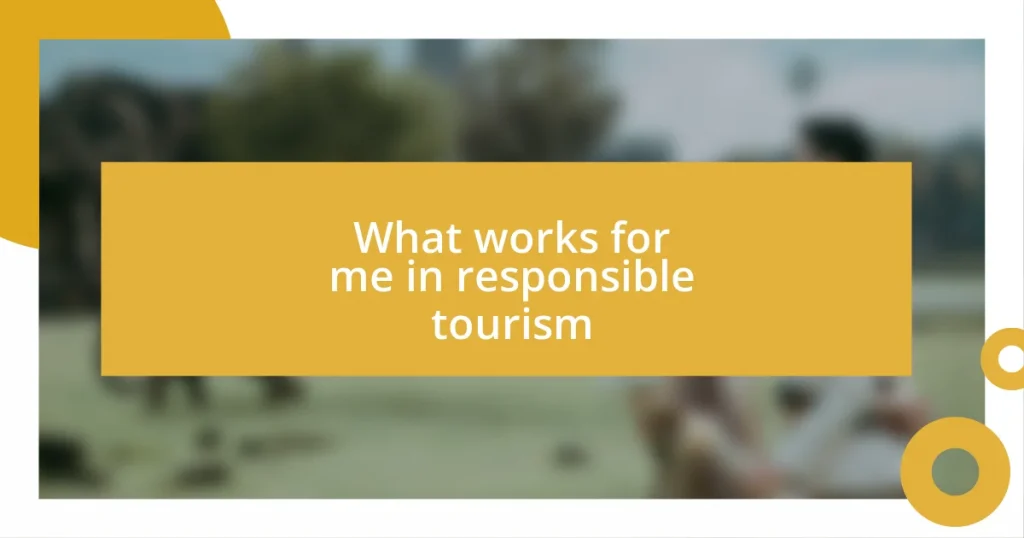Key takeaways:
- Responsible tourism encourages conscious decisions that support local communities, respect cultures, and minimize environmental impact.
- Core principles include sustainability, community engagement, and ethical consideration, fostering richer travel experiences and positive contributions to destinations.
- Engaging with locals and making eco-friendly choices enhances personal growth and deepens cultural understanding while promoting the preservation of traditions and ecosystems.
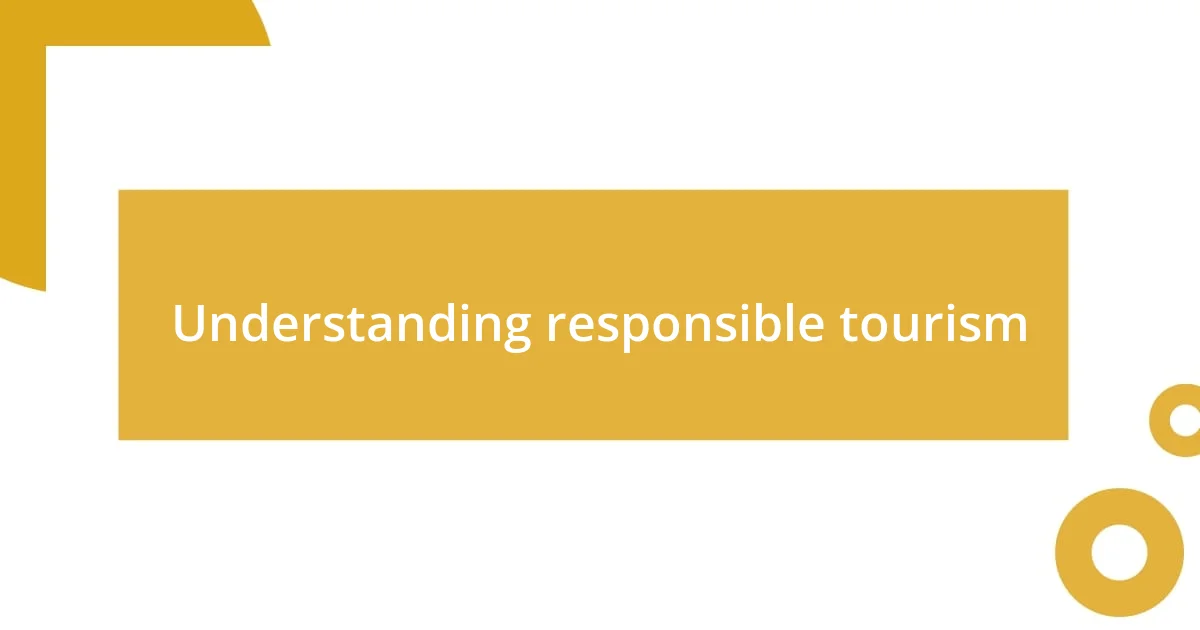
Understanding responsible tourism
Responsible tourism is all about making conscious decisions that positively impact the places we visit. When I traveled to a small village in Thailand, I chose to stay with a local family instead of a resort. This not only supported their livelihood but also allowed me to experience their culture firsthand. Isn’t it incredible how staying in a local home can transform the way you interact with a destination?
Embracing responsible tourism also means being aware of our environmental footprint. I remember hiking in a nature reserve where the guide emphasized leaving no trace behind. At first, I thought it was a minor detail, but it struck a chord when I realized that each piece of litter could disrupt the delicate ecosystem. How often do we consider the lasting impact of our visit?
Another vital aspect is understanding and respecting local customs and cultures. On one trip, I mistakenly wore shoes inside a local temple; I felt embarrassed when a kind local gently approached me to explain the importance of this rule. This moment reminded me of the deep connection between travel and cultural sensitivity. It leaves me wondering—how can we immerse ourselves in these experiences while honoring the traditions of our hosts?
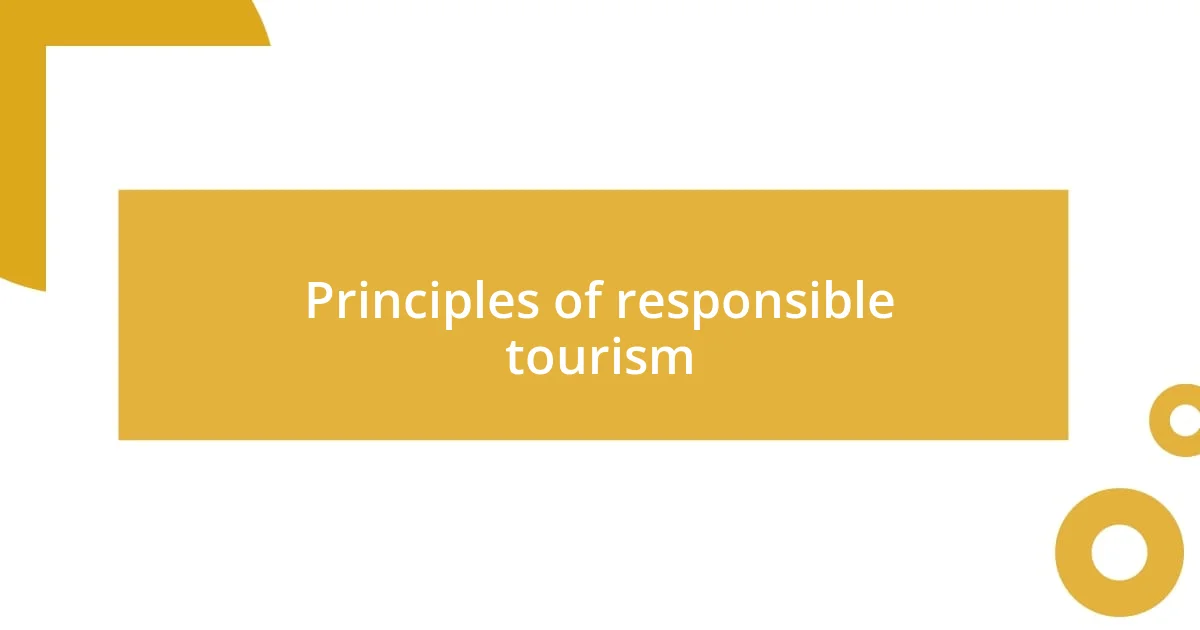
Principles of responsible tourism
Responsible tourism hinges on a few guiding principles that can transform our travel experiences into something more meaningful. One of these principles is sustainability, which reminds me of a trip I took to the Galápagos Islands. The guides were not just passionate about their conservation efforts; they emphasized how our small actions, like using eco-friendly sunscreen, helped protect fragile ecosystems. Watching marine iguanas bask on the sunlit rocks while knowing I was contributing to their habitat filled me with a sense of purpose.
Another core principle is community engagement, which I discovered on a recent journey to Costa Rica. I participated in a community-led project to restore local wildlife habitats. Being surrounded by locals who shared their knowledge and dedication made me realize how much richer our travel experiences become when we contribute positively to the places we visit. Just think—financially supporting local initiatives can have a ripple effect that strengthens these communities and enhances our understanding of their challenges and triumphs.
Lastly, ethical consideration plays a significant role in responsible tourism. I recall a visit to an elephant sanctuary in Thailand, where the ethical treatment of the animals was prioritized. It was a heartwarming experience to learn about the rescue efforts led by local activists. This encounter left me reflecting on how our choices can encourage animal welfare and promote ethical tourism. Isn’t it striking how our responsibility as travelers extends beyond enjoying the destination to safeguarding its integrity?
| Principle | Description |
|---|---|
| Sustainability | Making eco-friendly choices to protect natural environments |
| Community Engagement | Supporting local initiatives and participating in community activities |
| Ethical Consideration | Ensuring the ethical treatment of animals and cultural respect |
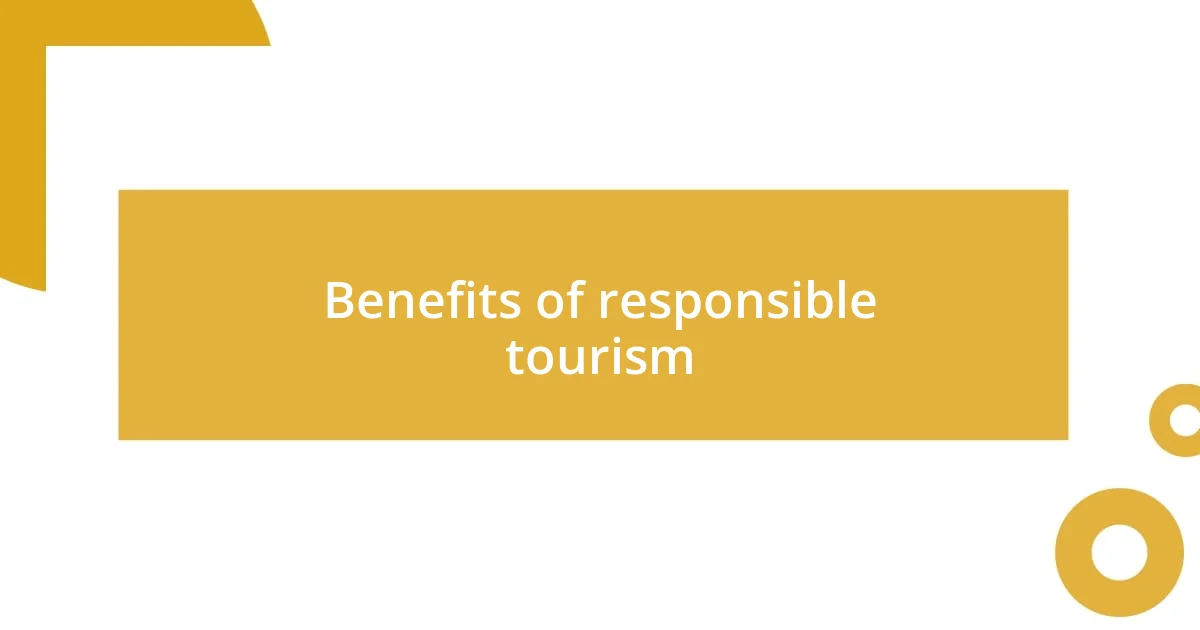
Benefits of responsible tourism
While diving into responsible tourism, I quickly realized the multitude of benefits it brings, not just for the destinations but for travelers like me too. One remarkable advantage is the opportunity for genuine connections. When I bought handmade crafts from local artisans in a small village, it felt different than shopping in a souvenir store. Each piece told a story, and every transaction felt like an exchange of culture rather than a mere purchase. This deepened my appreciation for the community and left me with beautiful memories that go beyond the tangible.
Here are some benefits of embracing responsible tourism:
– Cultural enrichment: Engaging with locals fosters understanding and respect for diverse traditions.
– Economic support: Contributing to local economies creates jobs and helps sustain communities.
– Environmental preservation: Responsible travel practices ensure natural habitats are protected for future generations.
– Personal growth: Traveling mindfully encourages reflection and a sense of global responsibility.
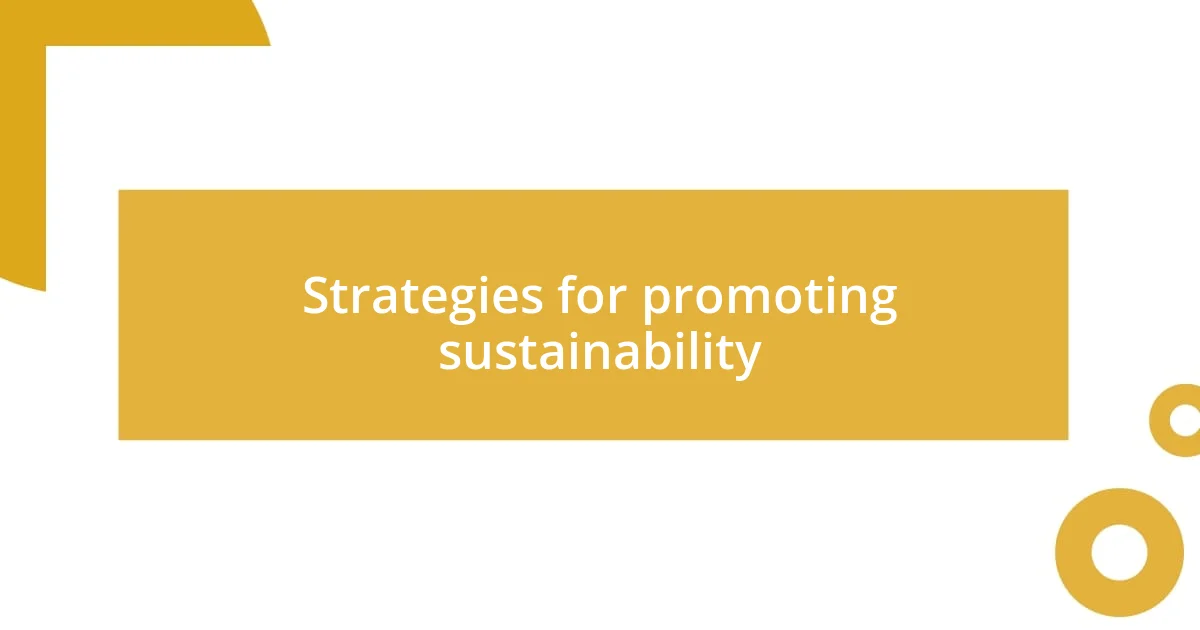
Strategies for promoting sustainability
When promoting sustainability in tourism, I’ve found that education plays a pivotal role. During a memorable trip to a sustainable farm in Peru, I learned about the direct impact of our consumption choices. The farmer passionately explained how organic practices reduce carbon footprints. It got me thinking—how many travelers, like me, are unaware of the power their choices hold? Raising awareness through workshops or guided tours can inspire travelers to embrace eco-friendly practices on their journeys.
In addition to education, forming partnerships with local businesses can significantly enhance sustainability efforts. While volunteering with an eco-tourism project in Thailand, I witnessed how collaborating with local hotels and restaurants created a movement toward zero waste. This not only benefited the environment but also fostered a sense of unity within the community. Can you imagine the transformative impact if every traveler consciously supported businesses committed to sustainable practices?
Finally, establishing incentives for sustainable behaviors can encourage more travelers to make responsible choices. I vividly remember receiving discounts at eco-friendly hotels when I opted for sustainable transport methods during my trip to Portugal. It made me feel valued for making choices that aligned with my environmental beliefs. Wouldn’t it be amazing if more destinations embraced similar models to reward eco-conscious travelers? This kind of strategy can truly make sustainability not just a responsibility, but an appealing way to travel.
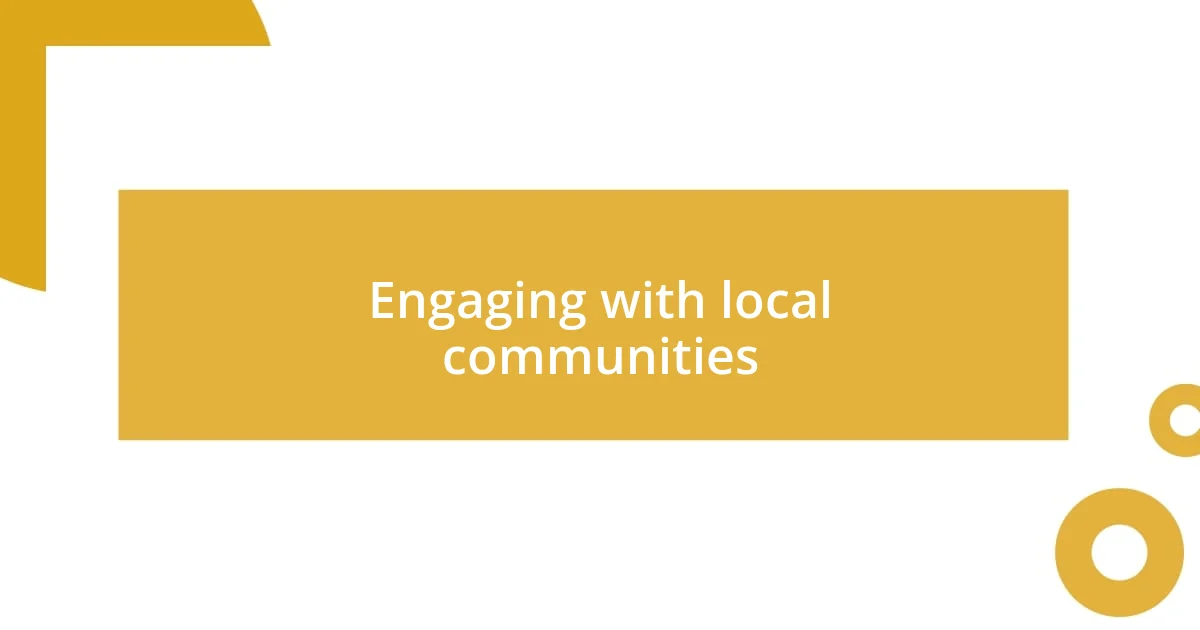
Engaging with local communities
Engaging with local communities goes beyond just visiting; it’s about immersing oneself in the heartbeat of the culture. On my travels to a fishing village in Morocco, I joined the locals for their morning catch. I still remember the laughter as we pulled nets from the water, the taste of fresh fish grilled over an open flame, and the stories shared under the sun. This kind of engagement offered me a sense of belonging, transforming a simple visit into a cherished experience.
I’ve often felt that when we take the time to connect with locals, our perspectives shift dramatically. Once, while exploring a bustling market in Bali, I struck up a conversation with a street vendor who shared her family’s struggles during the pandemic. Her resilience and warmth struck me deeply, prompting me to ask, how often do we truly listen to the stories of those whose lives are different from ours? These interactions not only enrich our travel experience; they remind us of our shared humanity.
Moreover, supporting local initiatives has profound ripple effects. While hiking through a rural community in Peru, I was invited to participate in a workshop on traditional weaving. Knowing that my participation directly helped preserve their craft was incredibly fulfilling. It made me wonder, what if more travelers sought opportunities like this? By investing our time and resources in local projects, we not only contribute economically but also help safeguard cultural legacies that might otherwise fade away.
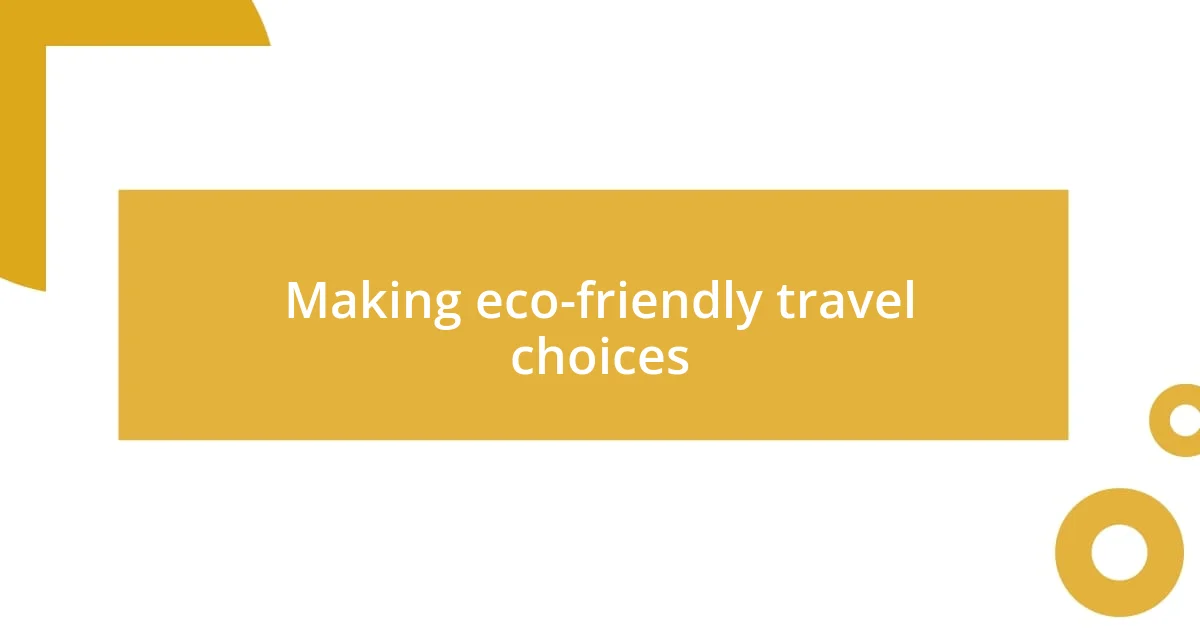
Making eco-friendly travel choices
Making eco-friendly travel choices often means rethinking how we approach transportation. On a recent trip to Costa Rica, I decided to forgo the rental car and explore the lush landscapes by bicycle. Pedaling through vibrant green paths, I discovered hidden waterfalls and quaint local cafes that I might have missed otherwise. It made me appreciate how mindful choices can lead not only to a lighter carbon footprint but also to richer experiences. Have you considered how your mode of travel might enhance your adventures?
Accommodations also play a significant role in our environmental impact. During my stay at an eco-lodge in the Amazon, I learned about their practices like solar energy and rainwater harvesting. Not only did I enjoy the tranquility of nature, but I also felt proud to support a place that prioritizes sustainability. This got me thinking—how often do travelers scrutinize their lodgings for eco-friendly certifications? It’s a small effort that can lead to significant change and inspire others to follow suit.
Dining choices are another area where eco-friendly decisions shine. I recall savoring a meal at a farm-to-table restaurant in Italy that sourced its ingredients from local growers. Every bite was a celebration of sustainable practices, and I felt connected to the community through each delicious dish. I often wonder—what if more travelers sought out restaurants with similar values, advocating for environmentally conscious eating? Supporting local agriculture not only enhances our travel but also fosters healthier ecosystems.

Measuring your impact while traveling
Measuring the impact of our travels often brings to mind the concept of sustainable footprints—how far our experiences extend beyond vacation photos. On one journey through the vineyards of France, I meticulously tracked my purchases and interactions. I realized that every bottle of local wine I enjoyed not only supported the winemakers but also contributed to the preservation of their land. Have you ever paused to consider the lasting effects of your choices on a destination? It’s a powerful realization.
I remember standing in a bustling village square in Thailand, absorbing the vibrant art and street performances. As I participated in a community workshop to create handmade crafts, I couldn’t shake the feeling that the money spent went much deeper than transactions. I was investing in local artisans and the preservation of their traditions. Reflecting on this, I asked myself—how can we ensure that our adventures bolster the very cultures that welcome us? Being part of that creative process made me acknowledge how personal involvement cements a traveler’s legacy.
After returning home, I took the time to calculate my travel emissions, an eye-opening exercise. When I discovered the impact of my long-haul flights, I became determined to offset them through reforestation initiatives. As I nurtured young saplings with a local NGO, I felt a surge of purpose—this connection was a way to give back. It led me to wonder, what if every traveler committed to a similar practice? It’s an inspiring thought, as small measures can weave a tapestry of positive change that envelops the globe.










